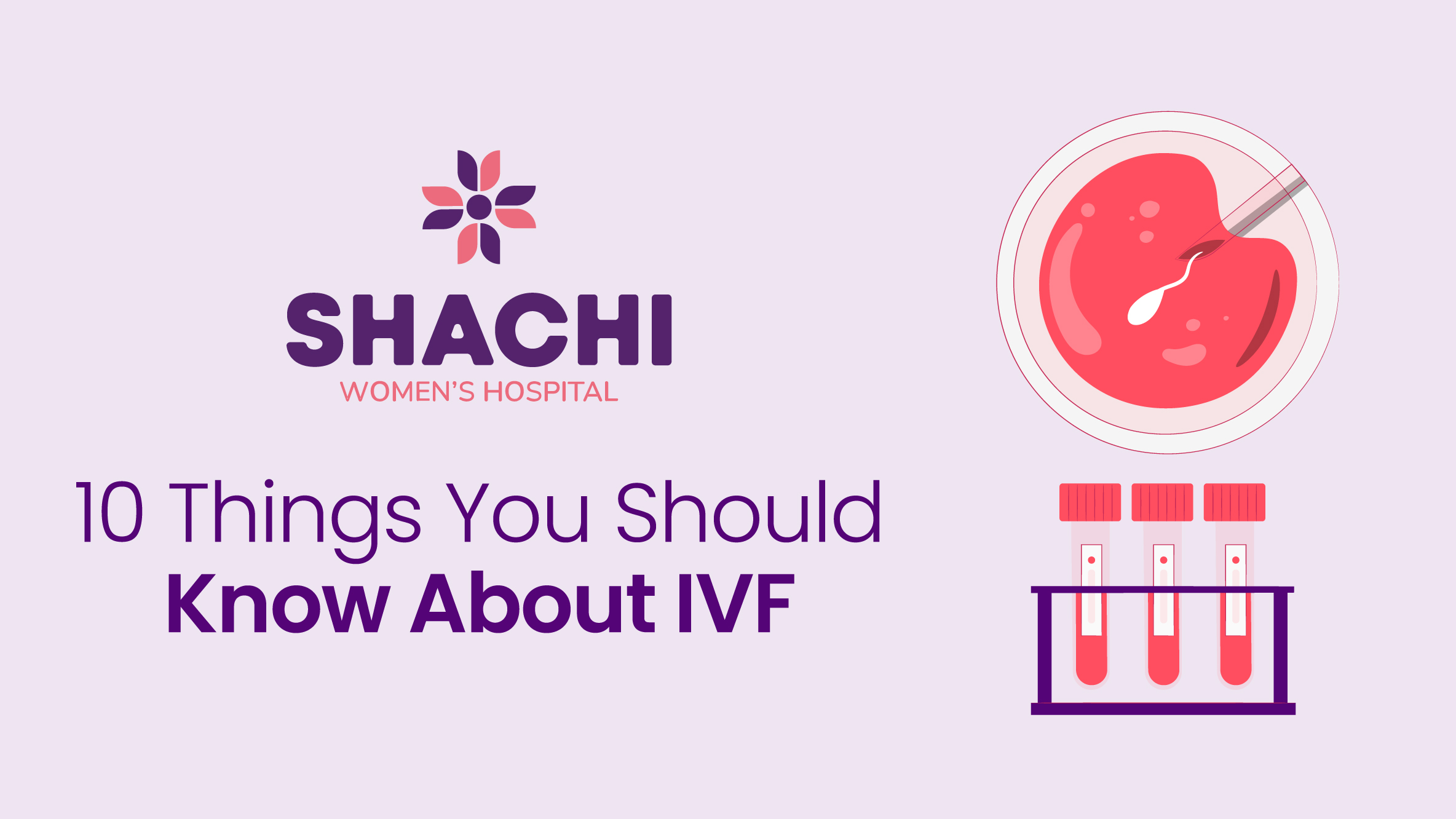
10 Things You Should Know About IVF
We live in a world where the journey to parenthood can sometimes be challenging. In-vitro Fertilization (IVF) is an assisted reproductive technology (ART) that has given hope to millions of couples facing fertility challenges. Our IVF Treatment in Ahmedabad has the latest technology and resources to bring your dream to reality. IVF is a complex series of procedures that guides individuals to pregnancy. It helps to treat any factor affecting fertility.
In any case, if you are beginning to explore fertility options or looking to get knowledge in understanding the complexities of IVF, the overall process could be overwhelming. There are many essential things to know before beginning on this journey. Our experts at Shachi Women's Hospital will guide you through the Top 10 Things You Should Know About IVF.
Treatment May Affect Your Schedule
IVF Treatment requires constant visits at the clinic, sometimes daily, but yes you can schedule it according to your busy schedule. The first step of the process is about 12 days of fertility medication, which includes egg retrieval and fertilization.
The embryo is transferred into the uterus around five days after fertilization. These steps require some time and will require you to temporarily put aside your other commitments.
Age as an Important Factor
Human ovaries contain about 1 million eggs at birth, and around 300 eggs mature naturally over a woman’s entire lifetime. However, the quality and quantity of these eggs start declining with age.
For example, A 25-year-old woman will have around 75% chromosomally normal eggs, but with time, the percentage keeps dropping to 10-20% until the age of 40. Chances of succeeding in the treatment increase if you begin at a younger age and are likely to have a healthy child.
Higher Chances of Multiple Pregnancies with IVF
To enhance the success rate, doctors may transfer more than one embryo into the uterus. The result can be multiple pregnancies if two or more of these embryos get implanted. However, chances are rare of having quadruplets or quintuplets, but when it comes to twins and triplets, it is not the same.
Although so many parents often welcome multiple births, it is an easy way for parents who want more than one child. Take note that sometimes multiple pregnancies can be responsible for premature birth and low birth weight. Therefore, staying careful for the mother’s health and potential issues.
The Longest 2WW (Two Weeks Wait)
The longest 2WW, which is a two-week wait, refers to the recommended waiting period before taking a pregnancy test after inserting the embryos. It is the time when you find out if the IVF cycle was successful or not. These 14 days could filled with anxiety and anticipation for couples who are undergoing fertility treatments.
Some couples are eager to take the test in the early days, which can lead to a false negative or rarely a false positive, which can be emotionally challenging for couples.
Lifestyle Impacts Your Egg Quality
What kind of diet and lifestyle plays a significant role in the health of your eggs?
Eating healthy and nutritious foods, Staying active and exercising, and getting sufficient sleep can help preserve egg quality. Your fertility specialist may recommend cutting off caffeine, alcohol, tobacco and other addictive substances if you are consuming it.
These changes are particularly beneficial for women, especially those who have PCOS/PCOD, because maintaining a healthy weight can improve their chances of succeeding in IVF treatment. Although these adjustments are not a quick fix, they can have a meaningful impact on overall fertility.
Quality of Sperm is Important
Sperm quality is as crucial as egg quality in the fertilization process. Factors like motility, sperm count, and shape all influence the sperm’s ability to fertilize an egg. A high-quality sperm can make fertilization more straightforward. However, if the quality of sperm is low, fertilization can still occur through advanced techniques and specialized male infertility treatments.
Hormones Can Be Descriptive
Administering various hormones is a part of IVF treatment, Such as estrogen and progesterone, particularly during the first two weeks. While these hormones stimulate egg maturation, they can also cause side effects. Physically, feeling nausea and hot flashes is common, while emotionally, you can experience mood swings.
Although very rarely, some women can face serious side effects, which include fluid retention, cysts, pelvic infections, and allergic reactions. Keeping in mind that infertility already is very challenging, and the hormonal treatments you go through can intensify stress and emotions. So, at this time, it is crucial to communicate with your family and friends and seek their support if you require it, as well as take advantage of the support service offered by the IVF clinic.
Multiple Treatment Cycle May Be Necessary
It is essential to know that not every IVF cycle will lead to pregnancy. However, that does not mean that the next cycle will not be successful. IVF is a complex process that needs patience and persistence. It is natural for a couple to feel discouraged after initial failure and start doubting their decisions. But sometimes it happens late but happens for good.
You Won’t Always Have To Start From Scratch
By now, we are very clear that some couples may need multiple IVF cycles to be successful. While you will not have to repeat every step each time by freezing embryos from a previous cycle, you can bypass the initial stages. Fresh and frozen embryos serve similar chances of success, with no clear advantage of fresh embryos transfer over frozen ones. Most clinics fertilize multiple eggs at once, preserving some for future cycles.
Moreover, using frozen embryos is a better option because of its flexibility with timing since you are not dependent on hormonal medications.
Advanced Techniques Can Enhance Success
IVF is a groundbreaking technology on its own. All the other procedures can further improve the chances of success. One of the techniques is Laser Assisted Hatching, which involves creating a small opening in the embryo's protective layer, making the task easy for the embryo to implant in the uterus. Before going towards the treatment, it is essential to beware about the IVF Procedure.
Another option is Preimplantation Genetic Testing (PGT), used to figure out genetic issues in the embryo before implantation and after ensuring that only healthy embryos are transferred into the uterus. PGT can detect countless genetic disorders, such as Down syndrome and Turner syndrome, and can be performed on fresh and frozen embryos.
Undergoing IVF is a significant decision for you and your partner, but selecting the right fertility clinic is crucial to your journey. At Shachi Women's Hospital, we prioritise providing the highest level of care, making sure that our patients get the best possible treatment. With a consistent pregnancy success rate over the years, a big thanks to our experienced doctors and cutting-edge technology, We offer a safe and supportive environment for your fertility treatments.


